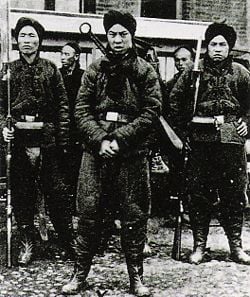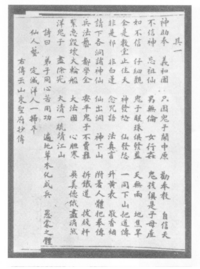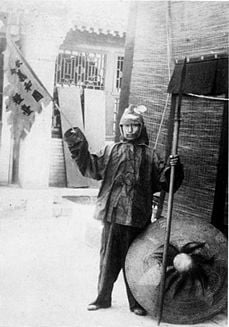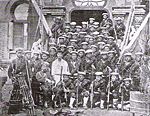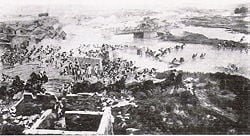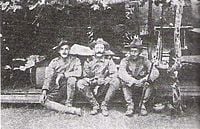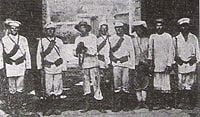49 Boxer Rebellion
The Boxer Uprising or Boxer Rebellion was a Chinese rebellion against foreign influence in areas such as trade, politics, religion, and technology that occurred in China during the final years of the Qing Dynasty from November 1899 to September 7, 1901.[1] By August 1900, over 230 foreigners, tens of thousands of Chinese Christians, an unknown number of rebels, their sympathizers, and other innocent bystanders were killed in the ensuing chaos. The brutal uprising crumbled on August 4, 1900, when 20,000 foreign troops entered the Chinese capital, Peking (Beijing). The European powers saw China as an imperialistic opportunity where they could gain influence and power without territorial sovereignty. Internal weakness in China and the suspicion that China might even implode resulted in the European powers negotiating more and more concessions by way of trading posts that were virtually independent colonies. The local population grew more and more unhappy with the presence of foreigners, suspecting their motives, resulting in the rebellion. When the rebellion was crushed, yet more concessions and monetary indemnity were claimed from China by the Russians, Germans, French, and British. The experience of the events leading up to and surrounding this rebellion continue to affect China’s perceptions of the world and its relations in the present day.
Anti-foreign movement
In 1839, the First Opium War broke out, and China was defeated by Britain. In view of the weakness of the Qing government, Britain and other nations such as France, Russia, and Japanstarted to exert influence over China. Due to their inferior army and navy, the Qing Dynasty was forced to sign many agreements which became known as the “Unequal Treaties.” These include the Treaty of Nanking (1842), the Treaty of Aigun (1858), the Treaty of Tientsin (1858), the Convention of Peking (Beijing) (1860), the Treaty of Shimonoseki (1895), and the Second Convention of Peking (Beijing) (1898).
Such treaties were regarded as grossly unfair by many Chinese. They had always considered themselves to be superior to foreigners, but their prestige was sorely damaged by the treaties, as foreigners were perceived to receive special treatment compared to Chinese. Rumors circulated of foreigners committing crimes as a result of agreements between foreign and the Chinese governments over how foreigners in China should be prosecuted. In Guizhou, local officials were reportedly shocked to see a cardinal using a sedan chair decorated in the same manner as one reserved for the governor. The Catholic Church’s prohibition on some Chinese rituals and traditions were another issue of contention. Thus, in the late nineteenth century, such feelings increasingly resulted in civil disobedience and violence towards both foreigners and Chinese Christians.
The rebellion was initiated by a society known as the Righteous Harmony Society (Yihe Quan) or in contemporary English parlance, “Boxers,” a group that initially opposed, but later reconciled itself, to China’s ruling Manchu Qing Dynasty. The Boxer rebellion was concentrated in northern China where the European powers had begun to demand territorial, rail, and mining concessions. Imperial Germanyresponded to the killing of two missionaries in Shandong province, in November 1897, by seizing the port of Qingdao. A month later, a Russian naval squadron took possession of Lushun, in southern Liaoning. Britain and France followed, taking possession of Weihai and Zhanjiang respectively.
The rebellion
Boxer activity developed in Shandong province in March 1898, in response to both foreign influence in the region and the failure of the Imperial court’s “self-strengthening” strategy of officially-directed development, whose shortcomings had been shown graphically by China’s defeat in the Sino-Japanese War (1894-1895). One of the first signs of unrest appeared in a small village in Shandong province, where there had been a long dispute over the property rights of a temple between locals and the Catholic authorities. The Catholics claimed that the temple was originally a church abandoned decades previously after the Kangxi Emperor banned Christianity in China. The local court ruled in a favor of the Church, angering the villagers who claimed they needed the temple for various rituals and had traditionally used it to practice martial arts. After the local authorities seized the temple and gave it to the Catholics, villagers attacked the church under the leadership of the Boxers.
The early months of the movement’s growth coincided with the Hundred Days’ Reform (June 11–September 21, 1898), during which the Guangxu Emperor of China sought to improve the central administration, before the process was reversed at the behest of his powerful aunt, the Empress Dowager Cixi. After a mauling at the hands of loyal Imperial troops in October 1898, the Boxers dropped their anti-government slogans, turning their attention to foreign missionaries (such as Hudson Taylor) and their converts, whom they saw as agents of foreign imperialist influence. The Empress Dowager Cixi, who credited the Boxers’ claim of magical imperviousness to both blade and bullet, decided to use the Boxers to remove the foreign powers from China. The Imperial Court, now under Cixi’s firm control, issued edicts in defense of the Boxers, drawing heated complaints from foreign diplomats in January 1900.
The conflict came to a head in June 1900, when the Boxers, now joined by elements of the Imperial army, attacked foreign compounds within the cities of Tianjin and Beijing. The legations of the Great Britain, France, Belgium, the Netherlands, the United States, Russia, and Japan were all located on the same city block close to the Forbidden City—built there so that Chinese officials could keep an eye on the ministers—were strong structures surrounded by walls. The legations were hurriedly linked into a fortified compound and became a refuge for foreign citizens in Beijing. The Spanish, Belgian, and German legations were not in the same compound. Although the Spanish and Belgian legations were only a few streets away and their staff was able to arrive safely at the compound, the German legation was on the other side of the city and was stormed before the staff could escape. When the Envoy for the German Empire, Klemens Freiherr von Ketteler, was kidnapped and killed on June 20, the foreign powers declared open war against China. The Chinese Court in turn proclaimed hostilities against those nations, who began to prepare military forces to relieve the besieged embassies. In Beijing, the fortified legation compound remained under siege from Boxer forces from June 20 to August 14. Under the command of the British minister to China, Claude Maxwell MacDonald, the legation staff and security personnel defended the compound with one old muzzle-loaded cannon and small arms.
Stories appeared in the foreign media describing the fighting going on in Beijing. Some were mere rumor or exaggerated the nature of the conflict, but others more accurately described the torture and murder of captured foreigners. Chinese Christians suffered even more greatly, as there were more of them and most were not able to seek refuge in the legations, having to seek shelter elsewhere. Those that were caught were raped as well as tortured and murdered. As a result of these reports, a great deal of anti-Chinese sentiment was generated in Europe, the United States, and Japan.
Despite their efforts, the Boxer rebels were unable to break into the compound, which was relieved by the international army of the Eight-Nation Alliance in July.
Eight-Nation Alliance
Military of the Powers during the Boxer Rebellion, with their naval flags, from left to right: Italy, United States, France, Austria-Hungary, Japan, Germany, United Kingdom, Russia. Japanese print, 1900.
First intervention
Foreign navies started to build up their presence along the northern China coast from the end of April 1900. Upon the request of foreign embassies in Beijing, 750 troops from five countries were dispatched to the capital on May 31.
As the situation worsened, a second international force of 2,000 marines under the command of the British Vice Admiral Edward Hobart Seymour, the largest contingent being British, was dispatched from Tianjin to Beijing on June 10. They were met with stiff resistance from Chinese governmental troops and were finally rescued by allied troops from Tianjin, where they retreated to on June 26, with the loss of 350 men.
Second intervention
With a difficult military situation in Tianjin, and a total breakdown of communications between Tianjin and Beijing, the allied nations took steps to reinforce their military presence dramatically. On June 17, they took the Dagu Forts commanding the approaches to Tianjin, and from there brought more and more troops on shore.
The international force, with British Lt-General Alfred Gaselee acting as the commanding officer, called the Eight-Nation Alliance, eventually numbered 54,000, with the main contingent being composed of Japanese soldiers: Japanese (20,840), Russian (13,150), British (12,020), French (3,520), American (3,420), German (900), Italian (80), Austro-Hungarian (75), and anti-Boxer Chinese troops.
The international force finally captured Tianjin on July 14, under the command of the Japanese colonel Kuriya, after one day of fighting.
Notable exploits during the campaign were the seizure of the Dagu Forts commanding the approaches to Tianjin, and the boarding and capture of four Chinese destroyers by Roger John Brownlow Keyes, 1st Baron Keyes.
The allied march on August 4—about 120 kilometers from Tianjin to Beijing—was not particularly harsh, despite approximately 70,000 Imperial troops and anywhere from 50,000 to 100,000 Boxers along the way. They only encountered minor resistance and a battle was engaged in Yangcun, about 30 kilometers outside Tianjin, where the United States’ 14th Infantry Regiment and British troops led the assault. The weather was a major obstacle, as it was extremely humid, with temperatures sometimes reaching 110 degrees Fahrenheit (43 Celsius).
The international force reached and occupied Beijing on August 14.
The United States was able to play a secondary but significant role in suppressing the Boxer Rebellion because of the large number of American ships and troops deployed in the Philippines as a result of the U.S. conquest of the islands during the Spanish American War (1898) and the subsequent Philippine-American War. In the United States military, the suppression of the Boxer Rebellion was known as the China Relief Expedition.
Aftermath
Troops from most nations (with the exception of American and Japanese) engaged in plunder, looting, and rape. German troops in particular were criticized for their enthusiasm in carrying out Kaiser Wilhelm II of Germany’s July 27 order to “make the name German remembered in China for a thousand years so that no Chinaman will ever again dare to even squint at a German.” This speech, in which Wilhelm invoked the memory of the fifth century Huns, gave rise to the British derogatory name “Hun” for their German enemy during World War I.
On September 7, 1901, the Qing court was compelled to sign the “Boxer Protocol,” also known as the Peace Agreement between the Eight-Nation Alliance and China, undertaking to execute ten officials linked to the outbreak and to pay war reparations of $333 million. Much of it was later earmarked by both Britain and the U.S. for the education of Chinese students at overseas institutions, subsequently forming the basis of Tsinghua University. The British signatory of the Protocol was Sir Ernest Satow.
The court’s humiliating failure to defend China against the foreign powers contributed to the growth of republican feeling, which was to culminate a decade later in the dynasty’s overthrow and the establishment of the Republic of China.
The foreign privileges which had angered Chinese people were largely canceled in the 1930s and 1940s.
Russia had meanwhile been busy (October 1900) with occupying much of the northeastern province of Manchuria, a move which threatened Anglo-American hopes of maintaining what remained of China’s territorial integrity and openness to commerce (the “Open Door Policy”) to all comers, but paid the concept only lip service. This behavior led ultimately to a disastrous Russian defeat (in the Russo-Japanese War) at the hands of an increasingly confident Japan (1904-1905), as they maintained garrisons and improved fortifications between Port Arthur and Harbin along the southern spur line of the Manchurian Railway constructed on their leased lands.
Results
During the incident, 48 Catholic missionaries and 18,000 members were killed, along with 182 Protestant missionaries and five hundred Chinese Christians.
The effect on China was a weakening of the dynasty, although it was temporarily sustained by the Europeans who were under the impression that the Boxer Rebellion was anti-Qing. China was also forced to pay almost $333 million in reparations. China’s defenses were weakened and Dowager Cixi realized that in order to survive, China would have to reform, despite her previous opposition. Among the Imperial powers, Japan gained prestige due to its military aid in suppressing the Boxer Rebellion and was first seen as a power. Its clash with Russia over the Liaodong and other provinces in eastern Manchurian, long considered by the Japanese as part of their sphere of influence led to the Russo-Japanese War when two years of negotiations broke down in February 1904. Germany, as mentioned above, earned itself the nickname “Hun” and occupied Qingdao bay, consequently fortifying to serve as Germany’s primary naval base in East Asia. The Russian Lease of the Liaodong (1898) was confirmed. The U.S. 9th Infantry Regiment earned the nickname “Manchus” for its actions during this campaign. Current members of the regiment (stationed in Camp Casey, South Korea) still do a commemorative 25-mile (40 kilometer) foot march every quarter in remembrance of the brutal fighting. Soldiers who complete this march are authorized to wear a special belt buckle that features a Chinese imperial dragon on their uniforms.
Controversy in modern China
Though the reaction of the Boxers against foreign imperialism in China is regarded by some as patriotic, others in China consider this movement as a rebellion (disorder; Mandarin Pinyin: luàn), a negative term in Chinese language, when described by commentators during the years of the Qing Dynasty and Republic of China. Chinese Communists have altered the perception of the rebellion by referring to it as an uprising (being upright; q_yì), a more positive term in the Chinese language. It is frequently referred to as a “patriotic movement” in the People’s Republic of China by Communist politicians.
In January 2006, Freezing Point, a weekly supplement to the China Youth Daily newspaper, was closed partly due to its running of an essay by Yuan Weishi (History professor at Zhongshan University) that criticized the way in which the Boxer Rebellion and nineteenth century history about foreign interaction with China was portrayed in Chinese textbooks and taught at school.

